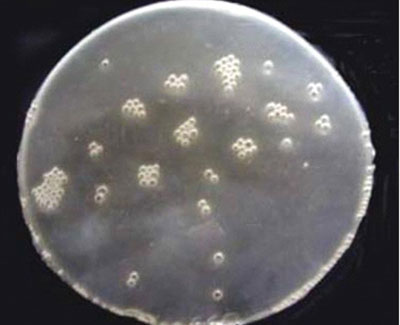| 2006 |

|
YEAR BOOK |
University College Dublin
|
Bacterial biofactories
|

Undoubtedly plastics are benefic-ial with wide ranging uses. However, there are major problems associated with them. Plastics are non-degradable and are therefore a huge source of pollution. One such widely used plastic is polystyrene. Less than 1% of polystyrene produced is recycled, which means that the majority of polystyrene products, after use, end up in landfill.
Our work focuses on a 2-step process of polystyrene breakdown. Polystyrene is converted to styrene at very high temperatures. Styrene is then fed to bacteria that break down styrene completely and simultaneously use the carbon in the production of a biodegradable plastic PHA (polyhyroxyalkanoate).
PHA is a very useful plastic. It is biocompatible as well as biodegradable and it is also very flexible in nature. For these reasons, there are a broad range of applications for the polymer, predominantly in the biomedical field where PHA has been used as scaffold material in tissue engineering, and as drug carriers. PHA has been previously used in shampoo bottles and the Greenpeace credit card.
By converting polystyrene to PHA, we are attempting to prevent pollution through recycling while simultaneously producing a natural, environmentally friendly, biodegradable plastic.
*Miriam Goff, Conway Synthesis and Chemical Biology, won third place in AccessScience 'O6; a competition for 3rd year post-graduates held in UCD in March 'O6. This is a summary of her presentation.
Contact: Miriam Goff,
UCD School of Biomolecular & Biomedical Science, UCD Conway Institute and CSCB,
University College Dublin, Belfield, Dublin 4
T: (+353 1) 7161309
E-mail: [email protected]